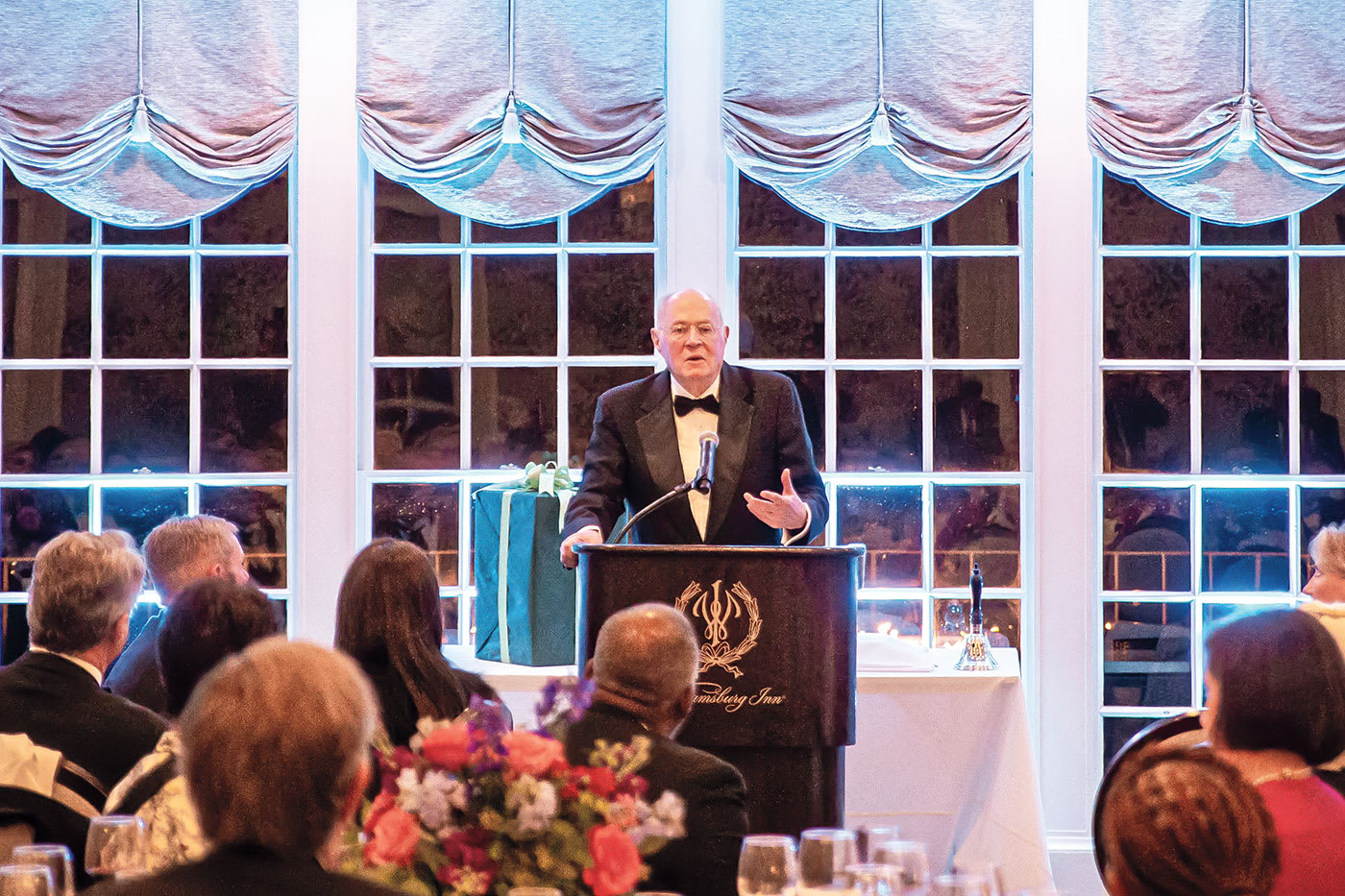“The rest of the world is looking at the United States to see what freedom looks like, and it’s up to us to show a culture, a discourse, a civic dialogue that’s enviable and admirable,” Anthony Kennedy said in 2018.
Kennedy, who had recently retired as an associate justice of the U.S. Supreme Court, was speaking after addressing the International Churchill Society, which studies and seeks to advance Sir Winston Churchill’s legacy. Long an admirer of Churchill, Kennedy spoke of the former prime minister’s commitment to freedom and echoed his call to champion human rights and espouse civil debate.
This past November, The Colonial Williamsburg Foundation recognized Kennedy’s own commitment to freedom and human rights. Upon his retirement from Colonial Williamsburg’s board as the longest-serving trustee in Foundation history, he was honored on Nov. 19, 2021, with both the Foundation’s prestigious Churchill Bell and its Williamsburg Award, given for an “outstanding contribution to the historic struggle of individuals to live free and self-respecting in a just society.”
The Williamsburg Award was originally envisioned as a way to draw attention to a person in modern life who “embodied the spirit of the great patriots” of the 18th century. It has been bestowed only once before: upon Sir Winston Churchill in 1955.
“Justice Kennedy exemplifies the spirit of the Williamsburg Award, just as Sir Winston Churchill did in 1955 as the first and only other recipient of Colonial Williamsburg’s highest honor,” said Carly Fiorina, chair of the Colonial Williamsburg Board of Trustees. “For his unwavering commitment to America’s founding ideals that were tested throughout his 43-year legal career, we honor him with the Williamsburg Award to express our appreciation for his work with the Foundation and for his contribution to America’s judicial system to champion the cause of freedom.”
Largely remembered for leading Britain through World War II, Churchill, in the postwar years, became chairman of the United Europe Movement and presided over the first Congress of Europe at the Hague. “In the center of our movement stands the idea of a Charter of Human Rights, guarded by freedom and sustained by law,” he told delegates.
Churchill “is one of my great heroes for many reasons, but not least because he recognized how essential human rights are to our world, to our civilization,” Kennedy said when presented with the awards. “We have rights because we are human. We have rights because we have dignity, and we must always respect the rights and dignity of others.”
When he retired from the court, Kennedy was lauded by Chief Justice John Roberts as a man who “taught collegiality and civil discourse by example.” Henry C. Wolf, a former board chair, echoed that sentiment, recalling the weight Kennedy’s words carried: “Whenever Justice Kennedy offered a thought or comment, everyone in the room listened intently because they understood full well that his thoughts were the crucible of creativity and that his words would ring with wisdom.”
“Justice Kennedy has dedicated his life to the impartial defense of the fundamental liberties for which our founding generation paid so dearly to uphold and protect,” said Colonial Williamsburg President and CEO Cliff Fleet. “Personally and professionally, he has set the highest bar of achievement and integrity for all of us, to which we all can and must aspire.”
During his 20 years of service on the board, Kennedy devoted his energy to issues of preservation, education, architecture and archaeology. His keen interest in architecture and design guided the redesign of the iconic Williamsburg Inn, the renovation and expansion of the Art Museums of Colonial Williamsburg and the design of the Colin G. and Nancy N. Campbell Archaeology Center, on which construction will begin soon.
Education on the meaning of America and its freedom must be perpetuated, Kennedy said: “We are here for a purpose. We are here to glorify the meaning of this nation — the meaning of America, the meaning of freedom — that must not be lost. And it will be lost if it’s not taught.”
Colonial Williamsburg benefactor John D. Rockefeller Jr.’s oft-repeated statement that “the future may learn from the past” became a Foundation motto. Kennedy suggested that the future must learn from the past.
“We must be identified...as being entitled to rights because we are people. Because we are humans. Because we are men. Because we are women. And this is what Colonial Williamsburg must teach,” Kennedy said. “This is the time in which the future must learn from the past.”
Kennedy also received the Churchill Bell, which evolved from the first Williamsburg Award and has been awarded only 13 times since its creation in 1992 as recognition of exemplary stewardship and outstanding service to The Colonial Williamsburg Foundation. As the 13th recipient, Kennedy joins Sandra Day O’Connor as the second associate justice of the Supreme Court to receive the honor. Other recipients through the years have included journalist Jim Lehrer, historian and former trustee Gordon Wood and former Colonial Williamsburg board chair, president and CEO Colin Campbell.
The bell, handcrafted by Colonial Williamsburg’s Historic Trades, symbolically links the present to the past as an enduring symbol of democratic ideals and the power of the human spirit. Upon receiving the award, Kennedy seized on that connection.
“The Churchill Bell rings for the past, and we must remember that past. It rings for the present,” Kennedy said. “So the bell will ring for the past, it will ring for the present and it will ring out for the future, saying: Please hear us. Please love us. Please love America.”
Anthony Kennedy was elected to the Colonial Williamsburg Board of Trustees in April 2001, retiring his service at the board’s November 2021 meeting. His election as a trustee continued a tradition of U.S. Supreme Court justices serving on the board that began with Lewis Powell Jr., who was succeeded by Sandra Day O’Connor. Justice Neil M. Gorsuch was elected to the board in January 2019.
